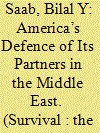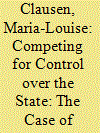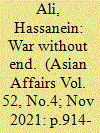|
|
|
Sort Order |
|
|
|
Items / Page
|
|
|
|
|
|
|
| Srl | Item |
| 1 |
ID:
188452


|
|
|
|
|
| Summary/Abstract |
The main factors American presidents typically consider before committing military resources to protect a partner include perceived US national interests, US domestic politics, the nature of the attack itself, the aggressor’s military capabilities and the possibility of escalation. An additional factor is the ability and willingness of the partner to conduct joint and combined operations with the United States and possibly others. This is critically important in the Middle East. As Washington prioritises the Indo-Pacific and Europe, US military forces will draw down in the Middle East and be less able to intervene promptly. To maintain strong regional deterrence, security arrangements between the United States and its Arab partners should be reconfigured to ensure that they can confront regional threats, Iran’s in particular, without immediate American assistance. The will require American advice and assistance in creating sustainable and effective joint forces.
|
|
|
|
|
|
|
|
|
|
|
|
|
|
|
|
| 2 |
ID:
196617


|
|
|
|
|
| Summary/Abstract |
Relations between the Russian Federation and the United Arab Emirates have evolved over the past decade into a strategic partnership owing to a seeming congruence of Russian and Emirati strategies across theatres in the Middle East, combined with the UAE’s intention to unofficially engage in “hedging” against the backdrop of the Russo-Ukrainian War. This article explores the reasons why the UAE has recalibrated its orientation vis-à-vis the United States, with an emphasis on how its leadership has worked to enhance ties with Moscow during a time of Great Power rivalry. From the UAE’s perspective, hedging constitutes the bedrock of a sound foreign policy focus. However, this article posits that Abu Dhabi also needs to appreciate the costs of adhering to a hedging agenda, especially when the Israel-Hamas War and tensions in Iraq, Syria, Iran, Lebanon, and the Red Sea could trigger a wider war. Although the United States and UAE harbour disagreements, the two states can still try to revise their divergent trajectories. Yet it remains unclear as to whether the contours of the USA-UAE strategic partnership can somehow be improved upon at this time. Alas, much depends on whether Washington and Abu Dhabi can find common ground on issues such as resuming a stalled deal to supply F-35 fighter jets; the possible brokering of a settlement between Israel and Palestine; the potential formation of a more robust security pact; and the UAE’s role in assisting the United States in countering Iran and its proxies’ nefarious activities.
|
|
|
|
|
|
|
|
|
|
|
|
|
|
|
|
| 3 |
ID:
159366


|
|
|
|
|
| Summary/Abstract |
This article argues that the current conflict in Yemen is better understood as a competition over who controls the state, rather than as a conflict between the state and a non-state actor. It traces the development of the Houthis and shows how the movement managed to seize key government institutions. However, the Houthis lack internal legitimacy and have not been able to position themselves as a nationally relevant political elite. The fragmentation of the Yemeni state has resulted in a shift to more localized struggles over access to resources and power that involve both internal and external actors.
|
|
|
|
|
|
|
|
|
|
|
|
|
|
|
|
| 4 |
ID:
196568


|
|
|
|
|
| Summary/Abstract |
Precision strikes from a distance are a common practice of state warfare. However, the global proliferation of precision strike technologies, like missiles and armed drones, makes such weapons progressively available to non-state armed groups (NSAGs). We look at Daesh in Syria and Iraq and at the Houthis in Yemen as two case studies to analyse the consequences of this proliferation for non-state warfare. Our focus is the socio-spatial dimension of warfare. We probe to what extent precision strike technology is used to conquer and control territory (solid warfare) or to weaken the enemy network without territorial ambition (liquid warfare). The predominant view in the literature on NSAGs perceives them as would-be state builders who desire to govern and hence, seek to control territory. Our findings support this view, as both Daesh and the Houthis have applied precision strike technologies for solid warfare. However, at the same time, both groups have used these weapons for liquid warfare, too, targeting in particular civilians and civilian infrastructure to weaken the network of their enemies. This poses new questions to scholars of small wars and insurgencies and calls upon policy makers to increase efforts to curb the proliferation of precision strike technologies.
|
|
|
|
|
|
|
|
|
|
|
|
|
|
|
|
| 5 |
ID:
197188


|
|
|
|
|
| Summary/Abstract |
Attacks by the Houthis, an Iran-backed armed group from northwest Yemen and now its de facto governing authority, pose a significant threat to commercial shipping in the Red Sea and the Gulf of Aden, and therefore to the global economy. Washington faces a range of unpalatable options to deal with this threat. The current approach of limited American and British airstrikes is flawed, but the alternatives – no airstrikes or more airstrikes – are arguably worse. Under a more ambitious strategy, the United States would through diplomacy help rebuild the internationally recognised government of Yemen, which nominally brings together anti-Houthi factions but is in fact fragmented and weak. Only this option has a realistic prospect of modifying the balance of power inside Yemen and containing the Houthis’ regional threat. Otherwise, the Houthis are likely to consolidate power, which would be a tragedy for the Yemeni people given the brutality of Houthi rule, and present a perennial danger to regional security given their ambitions.
|
|
|
|
|
|
|
|
|
|
|
|
|
|
|
|
| 6 |
ID:
183187


|
|
|
|
|
| Summary/Abstract |
On March 26, 2021, the civil war in Yemen entered its seventh year. Despite the multiple attempts made by the United Nations and other regional and international parties to end this war and launch negotiations leading to a comprehensive political settlement, these attempts have not yielded any tangible results, and the war continues.
|
|
|
|
|
|
|
|
|
|
|
|
|
|
|
|
|
|
|
|
|